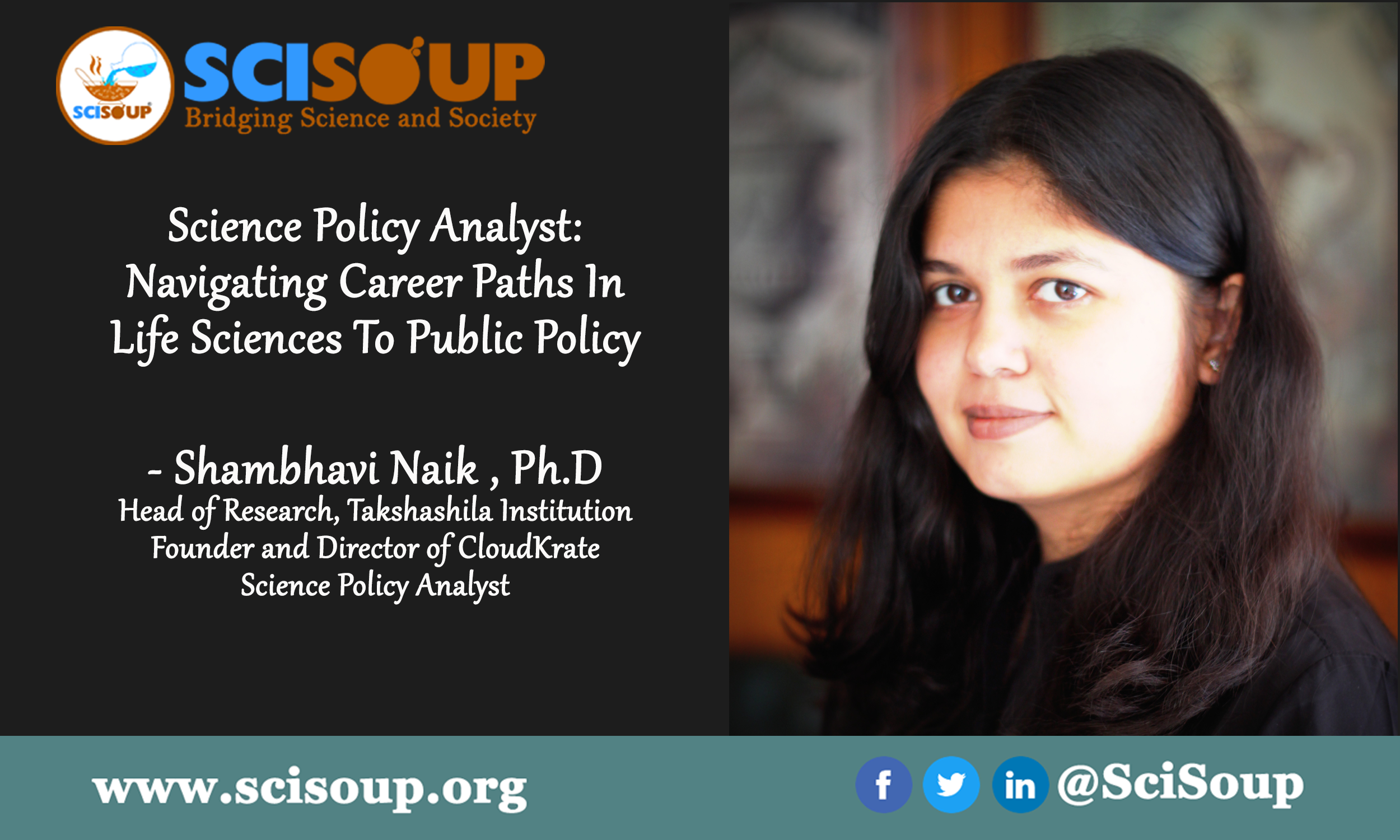
"there are not many precedents for those in academia who may choose to take other non-academic paths. This can create anxiety about job security. While this is reasonable, it is important to understand that lack of precedents also means there is very less competition in the field."
Jun 17, 2023 | BY DIVYA P. KUMAR AND RATNESHWAR THAKUR
In this 2023 edition of SciSoup's Career Development and Mentoring Blog Series, we are delighted to feature Dr. Shambhavi Naik, Head of research at the Takshashila Institution - an independent public policy think tank. She is the Founder and Director of CloudKrate Solutions Private Limited. In this SciSoup blog, Dr. Shambhavi Naik shares her valuable insights and experiences of her career paths in life Sciences and public policy with the SciSoup readers.
1) Could you briefly introduce yourself to the audience?
I head research at the Takshashila Institution, an independent public policy think tank and I am the Founder and Director of CloudKrate Solutions Private Limited. I have a PhD in Cancer Biology and after 3 years of post-doctoral training in India, I pivoted to studying public policy and founding my start-up in a bid to better understand the science ecosystem in India. At Takshashila Institution, I work at the intersection of public policy and life sciences, with a particular interest in governing emerging technologies such as gene editing or synthetic biology. At CloudKrate, I work to understand the information asymmetry in the life science supply chains in India. Additionally, I volunteer with educational institutes such as the Agastya International Foundation to create games based on biology. Apart from science, I am interested in sailing, reading and listening to old Hindi songs.
2) Describe your responsibilities in the current position that you hold.
At Takshashila Institution, I chair the advanced biology programme which includes identifying key areas of research, mentoring my young team and liaising with important stakeholders. I work on 3 major areas – identifying new applications in life sciences where India should have a clear policy; analysing existing or up-coming policies and consulting on policies for international organisations such as the WHO. I also teach courses on understanding life science policies or regulation of emerging technologies.
At CloudKrate, my role is to develop business through networking, conceptualise new strategies to offer better service and develop market intelligence on the life science supply chain.
3) You were active in academic research and then took up a role in the technology policy programme. How did this transition happen?
During my time as a postdoctoral fellow at InStem, my colleague Megha and I took the initiative to organize the first postdoctoral symposium. The purpose was to provide a platform for postdocs to showcase their research and discuss ways to enhance postdoctoral training and job security in the Indian academic sphere. Engaging with fellow postdocs and faculty members, understanding their concerns, and offering potential solutions - was an incredibly fulfilling experience for me.
Interestingly, during the event, senior faculty members who were invited expressed surprise at the sheer number of postdocs in India. They acknowledged the need for changes within the system after witnessing the symposium. Coordinating this event brought me more joy and satisfaction than the experiments I conducted in the laboratory. It was during this time that I also realized my lack of enthusiasm for the scientific publishing process, which seemed monotonous considering my career would depend on it.
At that point, a mentor introduced me to the Takshashila Institution. Gradually, I started engaging in discussions on gene editing and policy, eventually transitioning to studying and working there full time. This shift allowed me to pursue my interests and find fulfillment in a different career path.
4) What are the additional training(s) required or that you had to take up to fit yourself to the current profession?
After completing the Post Graduate Programme in Public Policy (PGP) at Takshashila Institution, I joined the organization as a research analyst. While my PhD equipped me with valuable skills in analytical thinking and communication, I recognized the need to broaden my knowledge in economics and existing public policy frameworks. Acquiring this knowledge proved instrumental in utilizing my analytical abilities to address policy challenges in the field of life sciences.
At CloudKrate, we incubated at NSRCEL, IIM-B as part of their Goldman Sachs Women Entrepreneur Programme. This helped me with basic skills needed to run a business- accounting, marketing and negotiating.
5) Can you discuss some recent policy decisions or initiatives that you were a part of and their impacts?
Few selected examples:
1. I was part of the Department of Biotechnology (DBT)’s drafting committee that drafted the guidelines for safety assessment of genetically edited plants. These guidelines remove SDN-1 and SDN-2 edited plants from a stringent regulatory process, which is otherwise applied to SDN-3 and genetically modified plants. This new policy should enable faster processing of novel genetically edited plants into Indian agriculture.
2. I have been an expert witness for the Rajya Sabha Parliamentary committee examining the DNA Technology (Use and Application) Regulation Bill in 2019. This responsibility included deposing before the Parliamentary committee, and participating in follow-up meetings till the committee’s report was completed for submission to Parliament. The Parliament is yet to debate the Bill, so the impact of the report on changing policy cannot be currently estimated.
3. I am a co-chair for the Think20 (T20) track looking at achieving sustainable development goals. The T20 is an idea bank for the G20 and consists of representatives from thinktanks of the G20 countries. The chairs and co-chairs are invited by the T20 Secretariat and are tasked with curating ideas for the discussion by the G20 at their summit event.
4. I am working with researchers at the Australian National University, Canberra to provide policy recommendations for the Quad countries to optimise collaborations within the biotechnology sector. This project is at the intersection of biotechnology and geopolitics. Our inputs are sent to the Quad biotechnology working groups for further study.
5. I am participating in an international collaboration researching global best practices for governance of somatic genome editing. The findings from this paper were recently presented at the Third Genome Editing Summit in London and a paper is currently being written. This paper will provide best governance frameworks for various countries to create their own governance mechanisms for genome editing in humans.
6) You are the founder of “CloudKrate”, What are the goals and vision of this start-up?
CloudKrate was founded with the primary objective of saving valuable research time for scientists, which was previously consumed by the procurement of laboratory supplies. However, as time passed, we recognized that a significant hindrance to the efficiency of this supply chain is the lack of balanced information. In light of this realization, CloudKrate aims to contribute to the advancement of life sciences in India through three key initiatives:
1. Providing scientists with visibility into product prices and delivery times, so that they can make informed decisions when purchasing products, saving them precious time and research funding.
2. Lowering product supply times to enable research to be performed with speed, a key requirement of cutting edge research.
3. Improving market access for local manufacturers to promote indigenous development of products.
7) Could you please share the future prospects of the career path you have chosen?
When I joined the Takshashila Institution, there were limited opportunities in the public policy domain specifically tailored for individuals with a science background. However, there has been a notable improvement in recent years, with an increasing recognition of science policy as a crucial driver for India's scientific advancement. As a science policy analyst, I have the option to pursue a career in various sectors, including think tanks, private companies, government agencies, and international organizations like the WHO. My primary focus and passion lie in actively shaping life science policies within India, aiming to make a meaningful impact on the country's scientific landscape.
At CloudKrate, I hope to guide a growing company to deliver on its vision – helping Indian scientists focus on their research.
8) If you were asked to provide 3- tips/ guidance to aspirants who would like to follow a similar career path, what would you suggest?
1. Do not be afraid to take the less-trodden path – there are not many precedents for those in academia who may choose to take other non-academic paths. This can create anxiety about job security. While this is reasonable, it is important to understand that lack of precedents also means there is very less competition in the field. When I moved to public policy, I was told that perhaps those who decide on science policy may not listen to someone who is outside academia. Yet, within a few years of the shift, I have managed to speak with the Parliamentary Science and Tech committee, represent India at a BRICS academic forum, enlisted by the DBT in a policy drafting committee and was invited by WHO to give comments on their gene editing guidelines.
2. Create networks outside academia – Academia can easily push you into silos – to understand what skills you bring to the outside world, it is important to engage with it. It is important to hear diverse perspectives and explore different fields before choosing to deep-dive into one.
3. Be patient – Moving out of a set career path to something new can be uncomfortable. I remember my early conversations at Takshashila Institution, where people would speak about economics or geopolitics and I would be left scrambling to write out the terms for later reference. But therein lies the learning and growing opportunity. It is okay to be uncomfortable – be patient, learn and you will find that things will get easier with time.
Disclaimer - SciSoup claims no competing interest. The opinions expressed by participants in this blog are solely their own and do not necessarily reflect the views or opinions of the blog creators or its affiliates. The purpose of this blog series is to raise awareness about non-academic careers and provide mentoring insights.

Send your opinions, questions, and suggestions for future column topics and stories - to scisoup@gmail.com and engage with us on